Landscape of the Mind - Applying Complexity in Organisations
The Complexity Research Group at LSE is committed to developing a perspective on complexity science specifically applicable to complex co-evolving human systems.
In pursuit of this aim, the Group conducts action research and consultancy with real organisations, on real issues, in real time.
Under the directorship of Prof. Eve Mitleton-Kelly, this work has included Landscape of the Mind (LoM), since 2000. Based on complexity principles, Landscape of the Mind opens up a fresh way of describing and working with the inner complexity which makes human agents so much more challenging and unpredictable than other types of actor.
Created as a collaboration between Kate Hopkinson, the originator of Landscape of the Mind, and the Complexity Research Group this new film draws together many illustrations of the approach in practice.
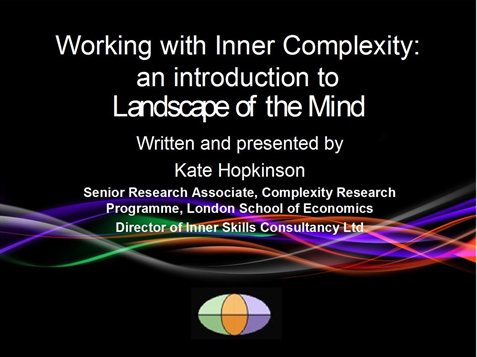
The film is a management and organisation learning resource. It is not an academic presentation of a theory; nor is it a training video. It explores the space of possibilities which open up, if the Landscape of the Mind model and methodology is used as a lens to illuminate practical experience in organisations. This in turn provides a powerful catalyst to more effective thinking and action.
The film includes brief coverage of some of the evidential base for the methodology, including before-and-after measures and the results of a neurocognitive pilot study. It also includes a dramatic example of the direct impact on a company’s bottom line, of using Landscape of the Mind as a developmental process.
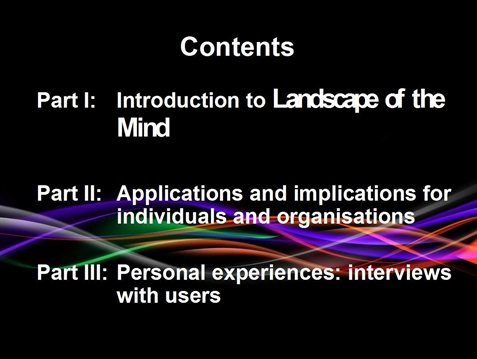
Who is the film for?
-
Executives and managers in organisations, facing the need to enhance effectiveness under conditions of unprecedented uncertainty, turbulence and change. This operating context requires a different approach to everything from leadership, to innovation, team development and talent management.
Then there is the unrelenting requirement to achieve ever more with ever less. Most large organisations are well into the law of diminishing returns with traditional cost cutting exercises. Landscape of the Mind has uncovered a distinctive emergent focus which allows access to untapped potential (see especially the sections of the film on the use of divergent inner skills, and reaping the divergence dividend).
-
Management and organisation developers, who are well aware that under pressure, organisations have difficulty recognising, let alone acting on, the need for substantive – and substantial - change. Landscape of the Mind provides a flexible series of “handholds” to facilitate the early stages of this often reluctant journey.
There is also full transferability using Landscape of the Mind, so that the organisation’s capability to tackle further challenges is raised, while subtle but profound culture change also supports continuing co-evolution rather than reversion to the status quo.
-
Individuals – self directed and virtual learners
The Landscape of the Mind approach offers an alternative to classical psychological theories and models. It can help you understand yourself, including your strengths, gifts and qualities, as well as any gaps, biases and blindspots.
Landscape of the Mind can take the heat out of relationships and situations where tensions may run high, and opens up constructive ways forward.
It can also give you a way of thinking about and progressing your professional development which will help you move forward.
Film contents
The entire film (including all three parts) is too long to watch in one sitting.
Part I
Part I introduces the Landscape of the Mind model and approach. It should be watched first, although some sections can be skipped as needed (see section titles below).
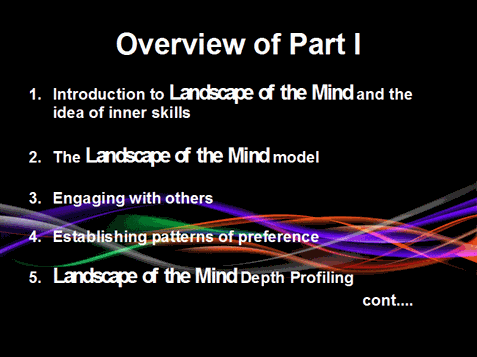
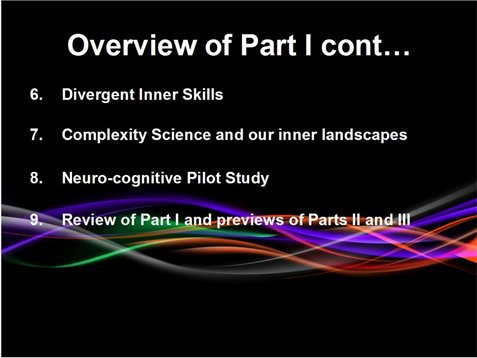
- Section 1: Overview of part 1
- Section 2: The Landscape of the Mind model
- Section 3: Engaging with Others
- Section 4: How do we establish patterns of preference?
- Section 5: Landscape of the Mind Depth Profiling
- Section 6: Divergent Inner Skills
- Section 7: COMPLEXITY SCIENCE and our inner landscapes
- Section 8: Neuro-cognitive Pilot Study
- Section 9: Review of Part I and previews of Parts II and III
Parts II and III can be dipped into on a pick and mix basis, depending on topic, interest or level.
Part II
Part II is a compendium of case studies and examples from real world projects, illustrating a range of applications of Landscape of the Mind:

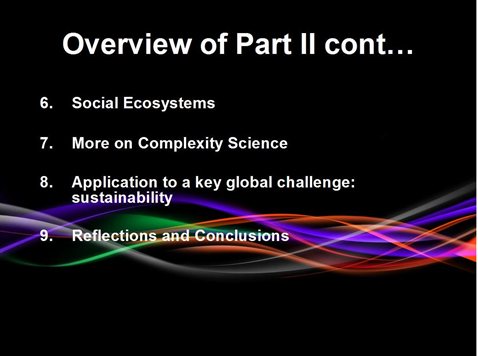
- Section 1: Overview of part II
- Section 2: Discovery verses Delivery
- Section 3: Landscape of the mind and leadership
- Section 4: Divergence and Innovation
- Section 5: Depth Analysis and Competencies
- Section 6: Social Ecosystems
- Section 7: More on COMPLEXITY SCIENCE
- Section 8: Application to a key global challenge: Sustainability
- Section 9: Reflections and conclusions
Part III
Part III allows users to take centre stage, and talk about their experiences of using LoM.
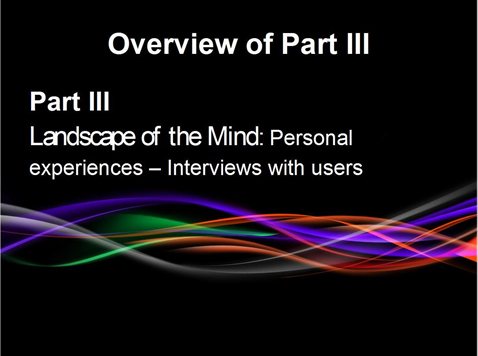
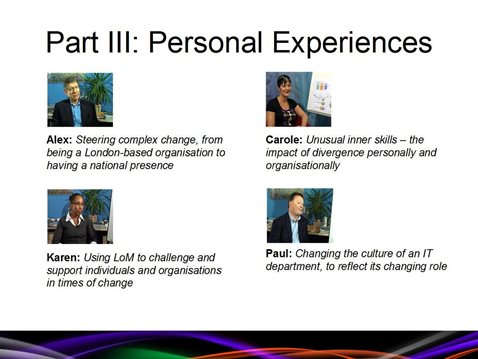
Copyright © 2015 Kate Hopkinson